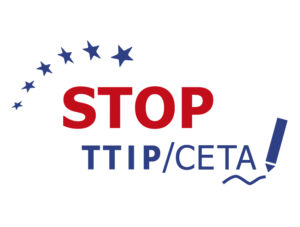Bruxelles mette fuorigioco i stati membri con l’accordo di libero scambio CETA
Martedì scorso il presidente della commissione europea Juncker ha indicato ai Paesi Bassi che i parlamenti nazionali degli Stati membri non hanno competenza sull’accettazione o meno di CETA, l’accordo di libero scambio tra l’UE e il Canada. Marianne Thieme ha chiesto la scorsa settimana nel parlamento un dibattito con il governo. Una maggioranza parlamentare ha sostenuto questa richiesta. L’accordo di libero scambio dà più potere alle multinazionali e minaccia la democrazia e le norme in materia di sicurezza alimentare, la privacy, il benessere degli animali e l’ambiente. Il Partito per gli Animali è contro CETA e vuole un referendum. Un accordo di libero scambio di tale ampia va sottoposto ai parlamenti nazionali dell’UE e i suoi cittadini.

Presidente Juncker vuole metter i parlamenti nazionali fuorigioco nell’approvazione o il rifiuto del CETA. Questo accordo di libero scambio tra l’Unione europea e il Canada non è solo una grave minaccia per la democrazia, il benessere degli animali, la natura, l’ambiente e gli agricoltori olandesi, ma è anche una porta sul retro per il mercato europeo per le società americane che hanno una filiale in Canada. Ed è proprio per quel motivo che per il Partito per gli Animali è della massima importanza che i Paesi Bassi hanno la possibilità di dire autonomamente no al CETA. Su iniziativa di Marianne Thieme il Parlamento avrà un dibattito con il ministro del Commercio estero, dopo la pausa estiva.
Thieme: “Per quanto riguarda Juncker CETA entra in vigore il più presto possibile, senza sentire prima i cittadini o singoli parlamento o anche di attendere il parere della Corte di giustizia europea! I Paesi Bassi devono aver la possibilità di dire sì o no al CETA. Preferibilmente in un referendum, ma almeno nel parlamento.“
Last Tuesday, the European Commission chairman Juncker informed the Netherlands that the national parliaments of the member states have no say in whether the EU enters the CETA agreement – the free trade agreement between the EU and Canada – or not. Marianne Thieme requested the cabinet for a debate last week. The majority of the Lower House backed this request. The free trade agreement gives more power to multinationals and threatens democracy and standards in the area of food safety, privacy, animal welfare and the environment. The Party for the Animals is against CETA and wants a referendum. Such far-reaching free trade agreement must be brought before the national parliaments in the EU and the EU people.

The EU chairman Juncker wants to sideline national parliaments regarding the approval or rejection of CETA. The free trade agreement between the EU and Canada is not only a serious threat to democracy, animal welfare, nature, the environment and Dutch farmers, but it is also a backdoor to the European market for American companies that have a subsidiary in Canada. For that reason the Party for the Animals believes that it is of the utmost importance that the Netherlands has the possibility to say no to the CETA independently. At the initiative of Marianne Thieme, the Lower House will go into debate about this with the Minister of Foreign Trade after summer recess.
Thieme: “As far as Juncker is concerned, CETA will take effect as soon as possible, without consulting EU citizens or independent parliaments and even without waiting for the advice of the Europe Court of Justice. The Netherlands should be allowed to say yes or no to CETA. Preferably by referendum, but at least in the Lower House.“